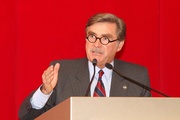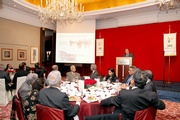The Hong Kong Jockey Club has been a Force for Good in society from its earliest days, Chairman T Brian Stevenson told members of the Indian Businessmen’s Association at a luncheon today (16 March), noting that prominent 19th-century members of the Indian community like Sir Hormusjee Mody had been among the Club's founding fathers.
Mr Stevenson said the Club's not-for-profit business model meant that its surpluses had always been reinvested in the local community, whether through the development of hose racing as Hong Kong's most popular spectator sport or through charitable donations.
Mr Stevenson noted that the Club had developed over the past 127 years from a private local racing club into a thoroughly international organisation, recruiting the best talent from around the world to offer truly world-class products and services to the local people. Today it ranks amongst the world's best, with a record 21 locally-trained horses listed in the World Thoroughbred Racehorse Rankings for 2011 and the annual Hong Kong International Races being recognised as the “Turf World Championships”.
"Yet despite the Club's very global outlook today, our roots remain firmly entrenched in Hong Kong, and our overriding mission is still serving the Hong Kong community as a provider of sporting entertainment and major community benefactor," Mr Stevenson remarked.
In 2011, the Club’s horse racing and betting operations recorded turnover of more than HK$128 billion, generating over HK$15 billion a year for public funds through betting duties and taxes. That equated to around 7.3% of all taxes collected by the Government and qualified the Club as Hong Kong’s largest single taxpayer, Mr Stevenson said. Since 1973 when the Club was first authorised to offer off-course betting, it had returned a remarkable HK$276 billion to the public purse. “Imagine the impact on salaries and profits tax if these payments were materially reduced.”
It would be wrong, however, to think that the Club was only involved in racing and betting, Mr Stevenson observed, as the Club is a “surprisingly diverse organisation.” Not only was it one of Asia’s leading membership clubs, he said, but also one of Hong Kong’s largest employers with nearly 27,000 full- and part-time staff. More than 10% of all part-time jobs in Hong Kong were provided by the Club.
“But most significant of all, to my mind, is that on top of these many contributions to the economy and the public purse, the Jockey Club donates significant elements of its surpluses each year to charitable and community projects,” he noted. “Last year our donations reached a record HK$1.62 billion.”
As the city’s needs and challenges had changed over the years, so too had the nature of the Club's contributions, Mr Stevenson told the guests. While in the 1950s it had addressed critical needs like new primary schools and clinics, it was later able to focus on projects that would foster Hong Kong's development as a world-class city, such as establishing the Academy for Performing Arts and Hong Kong University of Science and Technology.
Today, he said, the Club was working hard to help tackle Hong Kong's long term challenges by launching its own citywide projects like CADENZA: A Jockey Club Initiative for Seniors, which was aimed addressing the issues arising from Hong Kong's ageing population trend. “But equally important to us are the dozens of smaller community projects we support every year in areas like community services, healthcare, education and recreation.” These showed what a diverse organisation the Club was, and the many roles it played in Hong Kong life.
This Force for Good, however, was now at risk in the face of major challenges arising from the increasingly intense competitive environment and the difficulties the Club faced in competing effectively, Mr Stevenson cautioned.
The development of other gambling opportunities across the region, along with the huge growth of internet gaming, were providing local residents with more lifestyle choices, particularly the younger generation. This had led to a siphoning-off of Hong Kong’s community resources. To this end, Mr Stevenson said, the Club had embarked on various initiatives to provide a truly world-class entertainment experience to both new and existing customers.
The Club Chairman emphasised that he was “not complaining about the competition, nor suggesting Hong Kong emulate Macau or Singapore by going into the casino business – far from it. What we at the Jockey Club have been asking for is the opportunity to compete effectively with offshore and illegal operators, and a key issue here is taxation.”
Hong Kong’s betting duty rates on horse racing, at up to 75%, were by far the highest in the world, compared with 25% in Singapore and 15% in the UK, Mr Stevenson noted. Many overseas countries had long recognised that lowering tax rates could help fight illegal and offshore gambling, and retain revenue in the long term. Yet Hong Kong was missing the opportunities arising from the changing environment.
Commingling was another area where Hong Kong had a huge but unrealised opportunity, Mr Stevenson added. Close to HK$3 billion a year was already being bet overseas on local races, yet the city gained only modestly from this with the major benefits going to overseas operators instead.
"For the best interests of Hong Kong, I really hope we can tackle these issues soon," he told the guests. "What I would like to see is Hong Kong building on the world-class reputation and strengths it already has – its not-for-profit business model, its high integrity and its excellent horse racing product – to become a global centre of racing and betting entertainment."
The Hong Kong Jockey Club
Founded in 1884, The Hong Kong Jockey Club has become one of Hong Kong's best known and respected organisations, providing the public with world-class sporting entertainment as well as being the city's major non-Government community benefactor, now donating more than HK$1 billion a year to charitable and community projects. It has been a part of Hong Kong through good times and bad, sharing the city's growth and development with its people, and is dedicated to enhancing the quality of life for future generations.
|

Photo 1, Photo 2:
Speaking at a luncheon of the Indian Businessmena£į?s Association, Chairman of The Hong Kong Jockey Club T Brian Stevenson says the Club is not complaining about the competition, but asking for the opportunity to compete effectively with offshore and illegal operators so as to continue its role of being a a£į?Force for Gooda£į? in society.
|

|